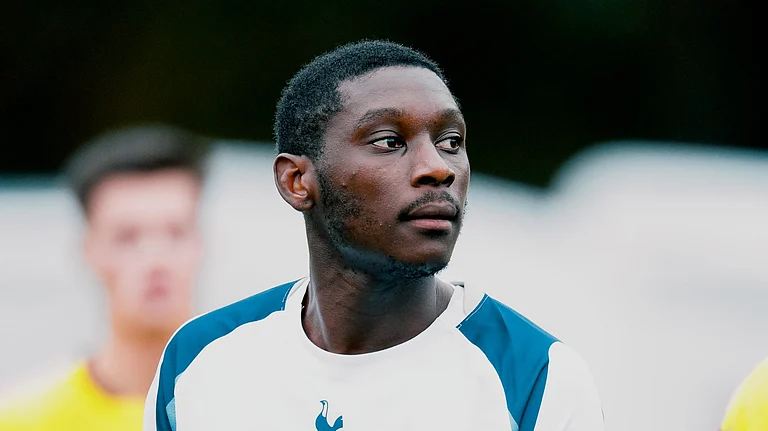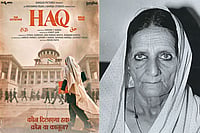The link that I get of Palestine director-actor Elia Suleiman’s Divine Intervention (2002) has no subtitle option. About 10 minutes into the film, I realise it’s not needed. There are two monologues in Arabic in the film, and they come towards the end of 90 minutes—one an army commandant with a megaphone giving nonsense orders to car drivers at a traffic intersection and another an old man ranting about the way the world is I presume. In an interview, Tim Burton—maker of such fantastical films as Beetlejuice, Charlie and the Chocolate Factory, Batman, Big Fish, Edward Scissorhands—says he thinks in images not in words, and most of the times he doesn’t have a script on the sets but sketches and storyboard of the shots.
Suleiman must also think like that. But unlike Burton’s grotesque and the twisted, his talent lies in piercing humour, deadpan and dark, making the political situation between Palestine and Israel into a theatre of the absurd. Suleiman is more Buster Keaton and French humorist Jacques Tati, as he has been compared to often, the world changing and collapsing all around him and he is a mute witness to it all. But the images, almost always static frames inside which the action takes place, are all political—barbed wires, check-posts, queues, soldiers, security officers, boots, police cars, guns, tanks, bullets in the sun-baked, dusty bare landscape.
Divine Intervention—celebrated at Cannes when it was released, couldn’t get an Oscar nomination as Best Foreign Film apparently because the Academy’s list didn’t have Palestine as a country—is a series of carefully crafted montages of life in occupied territory. Sample these: A man (played by Suleiman himself) is driving a car, eating an apricot, shot in profile from the adjacent seat. The shot continues till he takes four or five bites of the fruit, the scenery changing on the road beyond him. He comes to the apricot’s pip and casually throws it out of the car. It hits an armoured tank outside which is blown to smithereens. The shot continues with the man continuing to drive the car, unperturbed.

Many sequences are repeated with slight changes, as it happens in real life—old men sitting on a balcony, drinking tea, watching soldiers march by. Everyday a man throws garbage bags in his neighbour’s garden. The neighbour, a lady, throws them back on his front yard. One day he complains to her. She protests saying that he throws them in her garden. He argues that may be but what she is doing is wrong. (This bit needed subtitles, which luckily I found in a separate clip on YouTube.)
Another scene. A female foreign tourist walks up to a police van and asks for directions to the cop sitting inside, in English. The policeman doesn’t understand, he gets out of the van, opens the back door, drags a handcuffed, blind-folded prisoner out and asks him. The prisoner gives her some vague directions, pointing to three different roads. This sequence is repeated, presumably a few days later. The lady again walks up to the police van. This time the cop shows familiarity, shakes her hand. She wants to know the directions to another place. Again, the cop doesn’t understand, he gets out of the van, opens the back door. But today there is no prisoner, he has escaped! The cop frantically gets back in the van and begins to give chase.
It goes on like this. After static frames and silent actors, halfway down the film, suddenly, there is peppy music, zany camera angles and quick cuts. A tall woman in designer clothes, dark shades and high heels sashays down a sunny road walking towards a check post. The soldiers posted there don’t know what to make of it. One of them cocks his gun, another takes aim. But they stand frozen as she just walks past them haughtily. As she goes past the watchtower, it crumbles and falls, like a Buster Keaton gag in the silent era.

“In life, how little we speak and how long we remain silent,” reasons Suleiman, when asked in an interview why nobody speaks much in his films, especially the character he plays (well, I am sure we all have friends who will defy this statement). Suleiman has made only four features and many shorts and documentaries. At the acceptance speech of the European Achievement in World Cinema award, he says what he loves most is to just bum around, smoke and drink and pretend to be thinking, that’s why he makes one film in six or seven years. I couldn’t find It Must Be Heaven (2019) in any of the streaming platforms, but from the trailer, clips and reviews, it appears to be on the lines of Divine Intervention—darkly funny, static frames and almost silent. But the autobiographical The Time That Remains (2009) is a more formal film and luckily there is a print with English subtitles on YouTube.
Faud Suleiman, Elia’s father, is a gunmaker supplying arms to the rebels and constantly in trouble with the security forces. As a young man he is always on the run, many times caught and put in jail or left to die. A young Elia often gets punished in school for ‘having his head in the clouds’. The film traces the formation of Israel and the slow changes that follow in the lives of Palestinians. After living dangerously, Faud Suleiman dies of natural causes in old age, listening to music in his car outside a pharmacy, as a teenaged Elia looks on. The film changes tacks after this episode, becoming more sombre and sparse, when an older Elia Suleiman (playing himself) comes back to his childhood home.
Though The Time That Remains is a more conventional film, it is not without the Suleiman flourish. For instance, there is a sequence of a huge tank parked outside a house (goes without saying, in a stationary frame). A man comes out of the house to throw a garbage bag in the bin, when the muzzle of the tank starts to follow him (reminiscent of the memorable Tiananmen Square shot when a single protestor tries to stop a tank). Or, a group of youngsters are dancing in a room, seen from the outside through the huge French windows. A police car stops outside and a young cop announces on the speaker that curfew has been imposed; the dancing and music must stop. Nobody inside the house hears him, or pretends not to and they keep dancing. After two or three attempts, when the party doesn’t stop, the cop too starts to jive inside the police car. Then there is a sequence of Suleiman with a pole vault in front of the Bethlehem Wall. He runs with the pole, jumps and smoothly passes over to the other side in slow motion. How much more pizzazz can a filmmaker infuse into a dire political reality?
(This appeared in the print as 'Static Frames Of Turbulence')

































